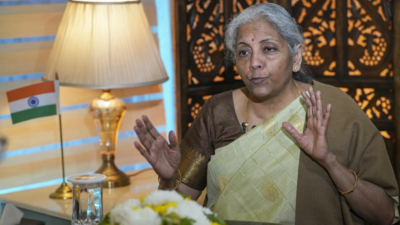NEW DELHI: Finance minister Nirmala Sitharaman, paraphrasing Abraham Lincoln, described the Union Budget as “by the people, for the people, of the people” during an interview with PTI on Sunday.
She said that Prime Minister Narendra Modi was fully supportive of
tax cuts
, but bureaucratic hurdles delayed the decision. “We have heard the voice of the
middle class
,” she said, acknowledging the long-standing concerns of taxpayers about unmet aspirations.
The finance minister announced revised tax slabs under the new regime, bringing significant relief to those earning up to Rs 12 lakh (Rs 12.75 lakh for salaried individuals, factoring in the standard deduction of Rs 75,000). Under the proposed system, their
income tax liability
will now be nil. However, capital gains will continue to be taxed at separate short- and long-term rates.
Previously, the nil-tax threshold stood at Rs 7 lakh. By raising it to Rs 12 lakh, the government has effectively eliminated tax payments for nearly 1 crore assessees, who would otherwise have been liable to pay between Rs 20,000 and Rs 80,000 in taxes. This provision is expected to result in a revenue loss of Rs 1 lakh crore to the exchequer.
The threshold for Tax Collected at Source (TCS) on overseas remittances under the Liberalised Remittance Scheme (LRS) has been increased from Rs 7 lakh to Rs 10 lakh, providing a boost to overseas travel and other international expenses. Additionally, remittances made for educational purposes—when funded by loans from specified financial institutions—will be exempt from TCS. Previously, such remittances were subject to a 0.5% TCS on amounts exceeding Rs 7 lakh.
Taxpayers now have an extended window to rectify errors in their tax filings. The time limit for filing an updated return has been increased from 24 months to 48 months. However, corrections will attract an additional tax and interest, cumulatively reaching 70% of the unpaid dues.


